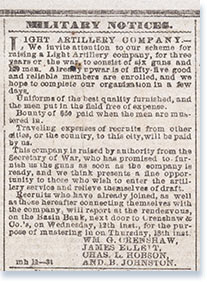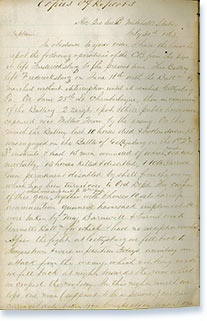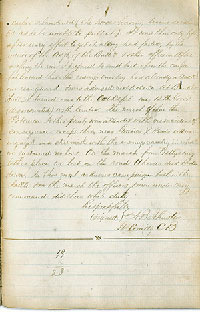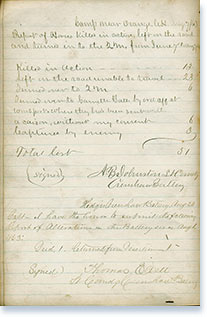The Civil War Letters of James Harvey Campbell
a collection of thirty-one civil war letters
James writes shortly after the Battle of Gettysburg from Bunker Hill, West Virginia after learning of the death of his father-in-law William Jones Bowis.
Bunker’s Hill, July 17, 1863
My Dear Wife,
I received two letters from you on my arrival at this place, which we reached the day before yesterday. They were the first I had received from you since leaving Fredericksburg, and I was very much overjoyed at hearing from you, though pained indeed at the intelligence of your dear father’s death, which I heard for the first time through your letter of the 22nd. You have indeed lost a kind friend, and one who cannot be replaced. I was not prepared to hear of his death, though your brother had written me that he was quite low. I do not think too much can be said of his goodness. He was only known to be loved. If there were such a thing as being too good he was certainly one of that kind. His many self-denying qualities made him the object of admiration to all who knew him, and was no doubt the means of his not having more of this worlds goods. I can indeed sympathize with you, as I knew as well perhaps as of anyone of his many excellent qualities. I have loved him as a father every since I knew him, and he was indeed worthy of the love of anyone. Oh! how desolate must be that family without him now. I very much fear that our concerns will suffer there now, as I suppose they will probably make a change in some way, and probably give up the house, in which case what is to become of our furniture? I know your brother will attend to it as far as he is able, but his time no doubt will necessarily be taken up with his own concerns. He wrote me word that Fanny was getting on tolerably well. I wrote you a short letter from Hagerstown, Md., on my return from Pennsylvania, but I do not know whether you ever got it, as I had to send it to Virginia by private conveyance, and did not have time to write more. We had a very hard time while in the United States, as we were marching or fighting nearly all the time. The roads were necessarily very bad, as I believe it was raining every day while we were in Pennsylvania, with one or two exceptions. We gave the Yankees a taste of what war is on their own soil, and I do not think they will forget it very soon. A great many of the men went in for plundering everything they could lay their hands on, principally something to eat, and I tell you in some instances the fowls and dairies suffered considerably. But Gen. Lee’s orders were very strict about interfering with private property, and all who took such things laid themselves liable to severe punishment. But it could not be expected that a set of men who had been living on soldier’s fare for two years, and find themselves suddenly transferred to a land of plenty, should be restrained all altogether. So some of them took everything they could lay their hands on that was good to eat. I could not muster the resolution to press but once, and that was when I was detailed by the Quartermaster to go in a store and press two barrels of molasses, on which occasion, as every man seemed to be going on his own hook, I appropriated a few segars, soap, sugar, etc. But bad as some of them were served, it is nothing compared to what they deserve. Things seem to be looking rather gloomy for us now, but I hope things will take a change soon. The fall of Vicksburg must be a terrible blow to the Confederacy, and the enemy are making great rejoicings over it.46 Indeed, some of the papers speak of the rebellion, as they call it, as already crushed. But probably they will find themselves slightly mistaken. I do not think we could have returned to Virginia if we had our ordinance trains with us. The three days terrible battle which was fought was probably not anticipated by our Generals, nearly exhausted our artillery ammunition, and the Potomac being full at the time, we could not replenish it. I thought since coming here that we would come back to Richmond, as I heard the Yankees were again threatening that place by way of the river, but the report is today that we are back across the Potomac. It is impossible of course for us to tell. We can only guess from what we see. I do not know what to expect about the Yankees being in King and Queen. There is no telling what damage they may not have inflicted on you all in this time, and it is indeed agonizing to me to know that they are so near you, my dear one, and all I hold dear on earth, while I am so far away, and not able to raise an arm in your defense. I can only hope for the best, and I trust that they may have left the county before this. I entirely agree with you about those cowardly ones who remain at home and inactive while these things are going on, as every Yankee could have been driven from Virginia if they had all volunteered who are able. Willie was slightly wounded in the shoulder in an action in Pennsylvania, and his company told me that he had been sent home.47 I tried to see him before he left, but could not succeed. I suppose you have heard from him by this time. Several of our men who were wounded have been sent to Richmond, two Youngs, brothers to Jos. Young, who were both slightly wounded48. If I could have seen Willie, I could have sent you money, but I do not like to trust it in a letter. I certainly have no earthly objection to your going in mourning for your Pa, but I doubt exceedingly whether you could procure the necessary goods even if you had the money. But if you can procure it anyway by borrowing it, I should be glad, and gladly refund the money. I wrote you in my last that I had a pair of shoes for you, but I fear they will be ruined before I can get them to you, as sometimes everything in my knapsack gets wet, and it is impossible to dry either my knapsack or myself for several days. I do not know what we will all do for clothing. I am now nearly naked and almost shoeless, and a great many are worse off than I am, and it is impossible to get clothing or shoes while we are so far from our base of operations. I am entirely unfit to go to anyone’s house, I am so dirty and ragged. I sent you my direction in my last, but as I do not know whether you got it or not, I will send it again. Direct to “Crenshaw Battery, Pegram’s Battalion, Third Army Corps.” Don’t direct to any Post Office. O when will this wicked war end. Less prospect of it than ever, it seems. I want to see you and the children very, very much. Give much love to them for me, and do not forget me in your prayers. I know I ought to be better, I have been spared amidst so many dangers. Remember me to sister Lum, and to all inquirers. Adieu.
Your devoted husband,
J.H. Campbell
P.S. I saw Cousin Alex. Jones a day or two ago. He was looking well, and is now a Captain in an Arkansas Regiment49.
Harvey




